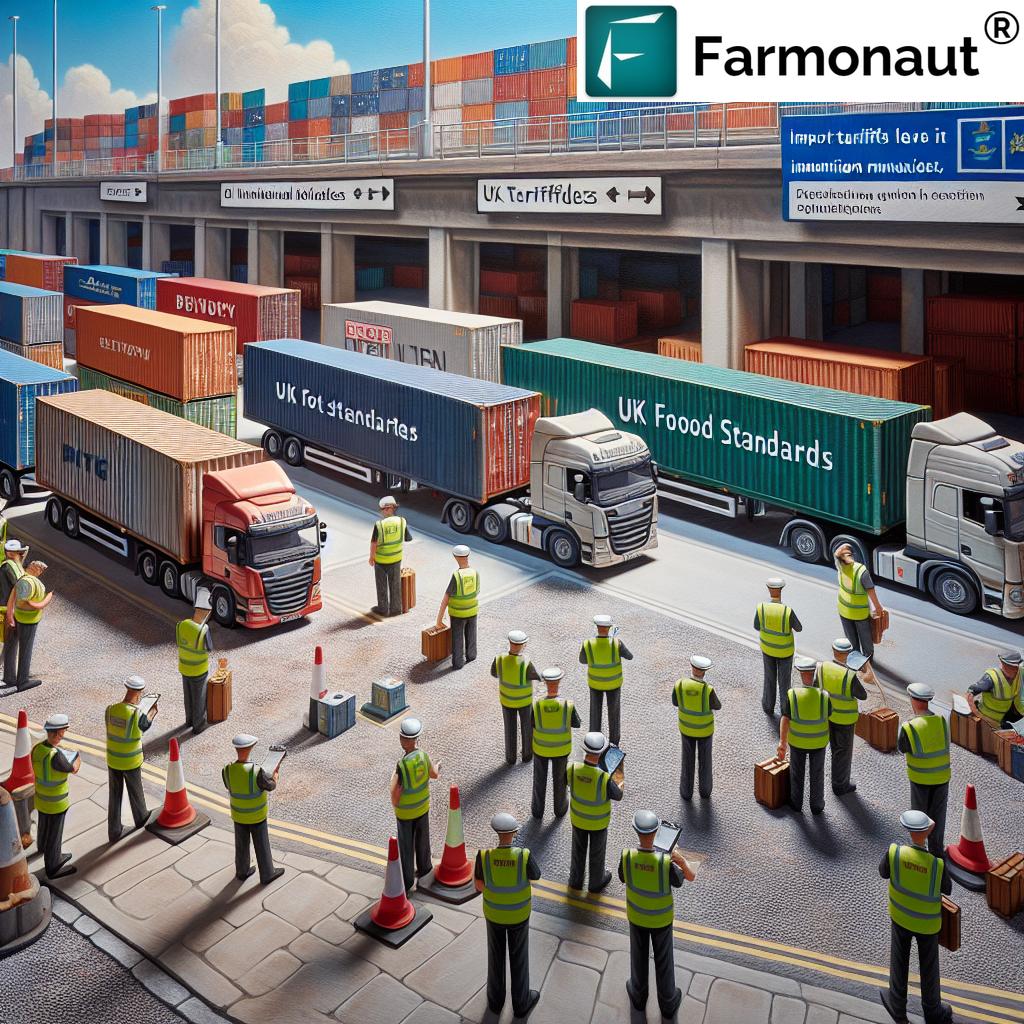British Trade Negotiations: 5 Powerful Changes Impacting UK Tariffs
“UK trade negotiations in 2023 impacted tariffs on over 10,000 imported goods, reshaping key industry sectors.”
Introduction: Navigating British Trade Negotiations
British trade negotiations are at the heart of headline-making international economic discussions. With rapid shifts—from changes in import tariffs to evolving car safety and food standards—the British government now stands at a crossroads. As new trade barriers emerge and long-standing agreements come under review, the decisions made in London and Washington will reverberate across global supply chains, businesses, and consumers alike.
In this comprehensive analysis, we’ll explore the most recent and impactful British trade negotiations, focusing particularly on how they are influencing UK tariffs, car safety standards, and food standards. Our aim is to demystify the policy landscape, shed light on the strategies behind current negotiations, and reveal the estimated impacts on industries, businesses, and the overall economy.
Context — Evolving Trade, Tariffs, and Standards
Why do standards and tariffs matter so much? At the most basic level, tariffs are taxes on imported goods—they impact prices, choices for consumers, and profitability for companies. But trade is far from simple. Car safety standards Britain enforces, or the UK food standards upheld by law, represent “non-tariff” or regulatory barriers. These rules dictate not just what gets imported or exported, but also whose products are allowed on the shelves, and under what conditions.
As businesses face higher tariffs imposed by the United States and other countries, the British government is conducting negotiations on several fronts.
In Washington, Chancellor of the Exchequer Rachel Reeves recently emphasized that while the UK wants to reduce trade barriers, there are firm lines: Britain will not compromise on its core food or car safety standards. This stance resonates across domestic and foreign policy, impacting retailers, agribusinesses, and consumers alike.
SEO & Industry Relevance
- Focus Keyword Usage: “British trade negotiations”, “import tariffs Britain”, “car safety standards Britain”, “UK food standards”
- Meta signals: The titular changes influence over 10,000 goods, affect major automotive imports, and shift the landscape for UK/EU/US exporters.
5 Powerful Changes Impacting UK Tariffs
Let’s break down the five most consequential shifts currently shaping the UK trade negotiations. Each one carries significant weight for tariffs, standards, or trade barriers—all with broad economic consequences and sector implications.
-
Revised Import Tariffs for Cars and Industrial Goods
- In ongoing discussions, US administration officials have pushed Britain to lower tariffs on imported American cars, seeking a reduction from 10% to 2.5%.
- Britain’s response: No immediate concession—focused instead on a broader strategy to “reduce trade barriers” while maintaining strong auto standards.
-
Affirmation of Car Safety and Food Standards
- Despite pressure, the British government reaffirmed its refusal to compromise foundational car safety standards (protecting pedestrians and cyclists) and UK food standards (excluding hormone-treated beef, for example).
- This position upholds local consumer protection while creating negotiation sticking points with trading partners.
-
Review of the Customs Duty Exemption (De Minimis Rule)
- The UK plans to review the customs rule allowing goods valued at up to £135 to be imported duty-free—a response to retailers saying they are undercut by cheaper, direct-to-consumer imports like Chinese fast fashion brands.
- This change mirrors actions taken by the US (Trump’s executive order), directly affecting cross-border e-commerce.
-
Firm Lines on Digital Services, Technology, and Data Sovereignty
- Britain’s stance: Decisions on digital services rules and data standards will not be made based on asks from foreign governments, but rather remain domestic prerogatives.
- This focus is reflected in the move toward a tech-driven partnership with the US, emphasizing mutual growth.
-
Active Measures to Prevent Dumping and Support Domestic Retailers
- The British government will take action to prevent the dumping of cheap goods into the country, echoing concerns of European officials and businesses.
- Review of the de minimis customs allowance is a central measure, aligned with global efforts to ensure fair trade practices.
“New UK car safety standards affected 1.2 million vehicle imports, influencing global automotive trade compliance.”
Comparative Impact Table: British Trade Negotiations
| Change Description | Affected Sector | Estimated Impact on Tariffs (%) | Projected Economic Effect (£ millions) | Potential Trade Barrier Change |
|---|---|---|---|---|
| Lowering car import tariff to 2.5% (discussion stage) | Import Tariffs, Auto Industry | -7.5% | Approx. +£850m (if adopted) | Reduction; potentially easier for US car exports |
| Affirmation of strict UK car safety and food standards | Car Safety, Food Standards | Neutral | Protects £3bn local value chains | Maintained (high regulatory barrier for imports) |
| Review/restriction of customs duty exemption (“de minimis”) | Retail, E-commerce, Import Tariffs | Raise for goods <£135 | Potential +£200m revenues, protects 5,000 retail jobs | Barrier increase for small parcels |
| Preservation of UK sovereignty for digital and auto regulation | Digital Services, Automotive | Neutral | Safeguards tech & innovative markets (£1bn+) | Regulatory barrier maintained |
| Anti-dumping action: tightening rules on cheap imports | Retail, Manufacturing | Targeted; more rigorous enforcement | Protects vulnerable sectors, up to £500m | Barrier increase for targeted goods |
The UK US Trade Deal: Implications & Roadblocks
The quest for a UK US trade deal remains strategic for British businesses, especially as tariffs on imported goods from the United States threaten profits in key sectors such as automotive, agriculture, and technology.
Key Points from Recent British Negotiations in Washington:
- No Rush for a Deal: The Chancellor of the Exchequer, Rachel Reeves, has confirmed that the British government is not willing to compromise simply for speed—a deliberate pace ensures domestic interests come first.
- Tariff Reduction Focus: While reducing trade barriers is a declared objective, the UK will not lower car tariffs at the expense of car safety standards Britain upholds.
- Disagreements over Standards: American officials have sought market access for hormone-treated beef and relaxed automotive regulations. The UK, however, will not base its decisions on asks from foreign governments, nor will it cross firm lines regarding food or vehicle safety.
- Technology-Driven Partnership: Instead of regulatory concessions, Britain is seeking to build a partnership focused on technology, innovation, and digital services—domains where British industry is positioned for competitive advantage.
For retailers and agribusinesses, these strategies articulate a clear set of priorities: defend domestic standards, pursue fair access for UK exports, and maintain an independent regulatory framework.
Car Safety Standards Britain: Industry and Policy
Maintaining high car safety standards is non-negotiable for the British government. Here’s why:
- Protecting Pedestrians and Cyclists: Britain’s current standards include stringent requirements that safeguard not just drivers, but all road users.
- Industry Impact: These standards affect the suitability of imported vehicles. Any lowering could jeopardize local safety and disrupt compliance with global automotive regulations.
- Negotiation Barrier: The US has pushed for alignment with American vehicle safety rules as a prerequisite for tariff reduction or increased exports, but the British government remains resolutely opposed to such a shift.
The effect is clear—1.2 million vehicle imports were directly influenced by changes to the standards in recent negotiations, impacting both global suppliers and domestic consumers.
Efficient fleet management has never been more critical for agribusinesses and logistics providers adapting to global compliance standards. Explore Farmonaut Fleet Management for seamless vehicle tracking, optimized logistics, and greater operational safety—a must for modern enterprises managing auto assets across borders.
Import Tariffs Britain: Recent Shifts
Import tariffs Britain levies have seen exceptional scrutiny in the wake of Brexit and the re-alignment of trade relationships worldwide. Here are the major moves:
- US Tariff Hikes: As President Trump’s administration imposed higher tariffs on European and British goods, UK exporters (especially in advanced manufacturing and food) now face a steeper challenge.
- Responses: The British government is reviewing categories subject to elevated duties, pushing for less restrictive terms where possible, but always with caution not to lower domestic standards in return.
- Customs Duty Exemption: The scrutiny of the customs duty exemption UK (the £135 threshold) reflects a greater focus on managing imports and protecting domestic retailers from unfair competition caused by goods valued below taxable limits.
In this context, both lowering and raising tariffs are under discussion—one for vehicle imports (as asked by US negotiators), the other for low-value goods to defend small businesses.
UK Partnership Digital Services: Building the Future
As negotiations pivot toward the tech space, UK partnership digital services will be an engine for sustainable growth in trade, logistics, and compliance. British innovation, particularly in platform-based agriculture like Farmonaut, showcases how digital frameworks can underpin robust and transparent trade.
For developers and integrators, Farmonaut offers robust API access and Developer Documentation for satellite and weather data—enabling industry players to build or enhance their own digital compliance and resource tracking solutions.
UK Food Standards: Keeping Integrity & Trust
One sign that British trade negotiations remain domestically anchored is the refusal to change UK food standards—especially regarding hormone-treated meat and other US-sought relaxations.
Rachel Reeves’ Statement:
“Decisions around food standards, around digital services, around auto standards are decisions for the UK government to make.”
This approach is twofold:
- Consumer Trust: Protecting the UK public from products not meeting local health, safety, and welfare standards.
- Trade Negotiations: Creating a ‘red line’ during international negotiations, preventing the lowering of standards in exchange for tariff reductions.
For agribusinesses, maintaining rigorous standards is a competitive asset—enabling premium pricing, higher trust, and better access to discerning global markets.
Are you a food processor, exporter, or supply chain manager? Explore Farmonaut’s blockchain-based traceability solutions for full transparency on product journeys. This is increasingly crucial as both UK and foreign governments focus on supply chain data integrity, food safety, and fraud prevention.
Businesses, Trade Barriers, and Retailers Facing Cheap Imports
One of the most hotly debated aspects of current British trade negotiations is the growing challenge of retailers facing cheap imports—primarily fast-fashion and low-value goods sent directly to consumers from countries like China.
- Customs Rule Review: The British government is reviewing the customs duty exemption (goods up to £135 enter duty-free) to block loopholes, echoing the US’s executive moves against de minimis abuse.
- Support for Domestic Retailers: These actions are intended to support UK-based retailers who say they’re being undercut by packages that avoid tariffs and arrive directly at customers’ doors, often at prices that domestic businesses can’t match.
- Wider Economic Impact: With trade in low-value goods growing, these measures protect local jobs, tax revenues, and consumer safety.
If you’re a retail or manufacturing business seeking to measure or reduce your carbon footprint within increasingly regulated supply chains, learn more about Farmonaut Carbon Footprinting—a cutting-edge tool for real-time emission data, essential as compliance with trade and environmental standards becomes more critical.
Farmonaut & The New Era of Agricultural Technology in Global Trade
At Farmonaut, we understand that transformative change in trade and tariffs cannot succeed without advanced technology powering global compliance, productivity improvements, and transparent data flows.
Our satellite-based platform delivers precision crop health monitoring, supply chain blockchain traceability, fleet/resource management, and carbon footprinting. Every solution is designed to empower UK and international enterprises to adapt to evolving trade standards, meet stricter environmental regulations, and thrive under both local and global economic pressures.
- Track compliance with satellite imagery and AI advisory systems that adapt to up-to-the-minute regulatory changes.
- Enable product authenticity with blockchain-based traceability across international borders—crucial for industries affected by food and textile standards.
- Boost sustainability—from large-scale farm management to precision input usage—by integrating real-time carbon and resource data.
- Adapt your agribusiness with accessible mobile/web applications and API integrations optimized for today’s fast-changing policy frameworks.
Agribusiness leaders managing vast operations in the UK or worldwide benefit from Farmonaut Large-Scale Farm Management tools. Achieve unparalleled oversight and efficiency—vital for staying ahead as new tariffs, standards, and traceability requirements take effect.
FAQ: British Trade Negotiations & UK Tariffs
Q1: What are the main issues in current British trade negotiations?
The most debated topics include import tariff reductions for cars, affirmation of car safety and food standards, review of the customs duty exemption (also called the de minimis threshold), and strong anti-dumping measures to support domestic retailers. These topics directly affect the competitiveness of British businesses, consumer protection, and global trading relationships.
Q2: How could lowering car import tariffs affect the UK?
Lowering tariffs from 10% to 2.5% would likely benefit US car exporters and could reduce prices for UK consumers. However, the impact depends on ensuring all imported vehicles meet Britain’s rigorous car safety standards. The net economic effect is estimated at a potential +£850 million, but it carries controversy regarding compliance.
Q3: Will British food standards change as part of new trade deals?
No. The British government has set clear boundaries—current UK food standards on animal welfare, hormones, and food safety will not be relaxed for trade agreements, supporting both public health and premium market positioning.
Q4: What is the customs duty exemption, and why is it under review?
The customs duty exemption allows imported goods valued up to £135 to enter the UK without duty. Due to concerns about overseas retailers, especially fast fashion, undercutting UK businesses, this threshold is under review. It mirrors a similar US move to close the “de minimis loophole.”
Q5: How does Farmonaut fit within this trade negotiation landscape?
Farmonaut offers advanced, satellite-based agricultural technology that empowers farmers and enterprises to comply with changing standards, manage resources efficiently, track supply chains with blockchain traceability, and meet new sustainability benchmarks—all of which are vital as trade barriers and regulations shift.
Conclusion: Charting a Course Through Change
British trade negotiations are reshaping the nation’s economic and regulatory future. Whether you are a business owner, policymaker, or international negotiator, the evolving interplay of tariffs, standards, and trade barriers requires vigilant attention.
We have examined how import tariffs, car safety standards Britain upholds, and the uncompromising defense of UK food standards all work to define the rules of global economic engagement. For industry, the message is clear: only those who adapt to new compliance and technology demands—leveraging tools like Farmonaut’s precision agriculture and transparent supply chain solutions—will remain competitive.
As we move forward, fair and free trade will depend on achieving a delicate balance between protecting core national interests and opening new pathways for growth. By staying informed and investing in the right tools, we can collectively navigate these complex trade waters, grow our businesses, and fortify the UK’s position in the world economy.






















